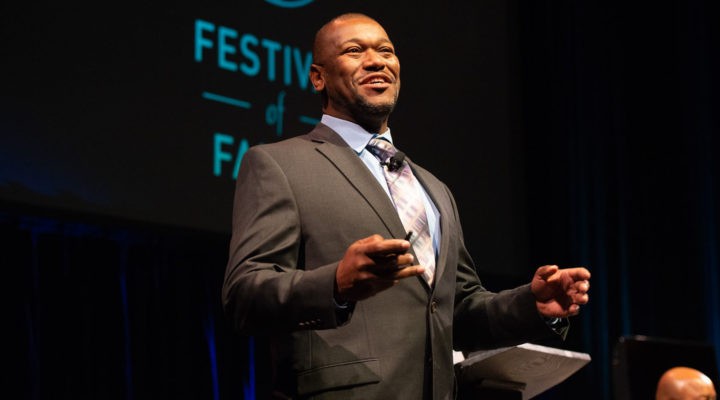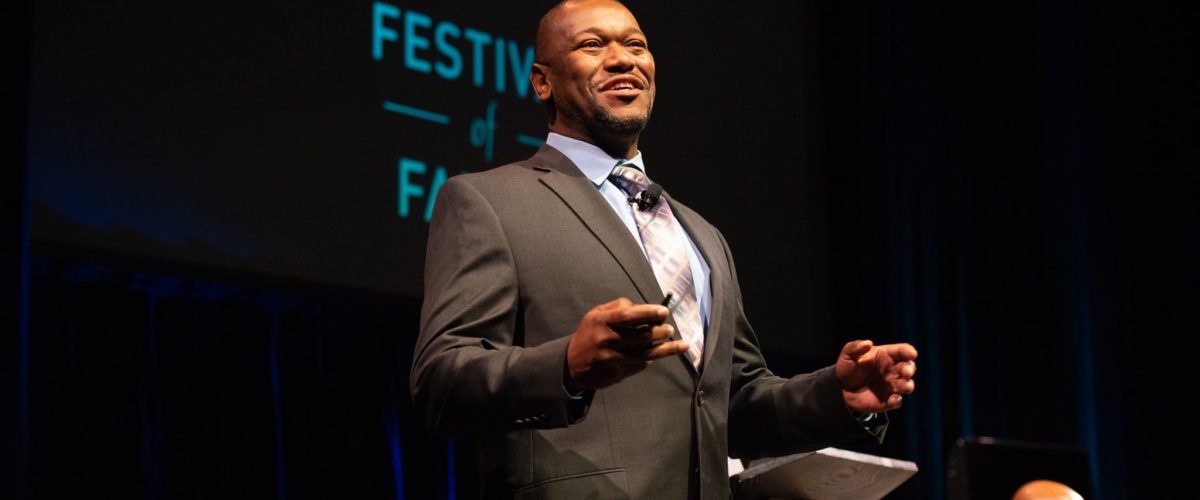As he consults with Black congregations, Black church scholar Lewis Brogdon often advises them to prioritize adding a mental health professional to their staffs.
That’s because Brogdon, director of the Institute for Black Church Studies at Baptist Seminary of Kentucky, has seen the trauma that racism perpetrates on Black people.
“Our sisters and brothers in the mental health field are going to be some of the most important leaders in the Black community in the next few decades as we continue to talk about the impact of racism on overall health,” Brogdon said during the Festival of Faiths held Nov. 18-20 in Louisville, Ky.
High rates of depression and hypertension are among the poor health indicators in the Black community, Brogdon said. “In the 1970s, African Americans were the least likely to commit suicide and that data has flipped completely. The last funeral I did was for a Black kid, 19 years old, who took his own life.”
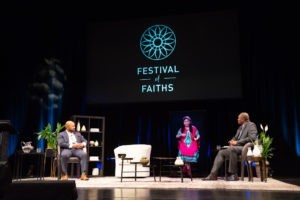 Brogdon was a panelist in a discussion that focused on “Black Faith’s Encounter with Black Trauma, Pain and Nihilism” at the 25th annual Festival of Faiths. This year’s festival was titled “Sacred Change: Essential Conversations on Faith and Race.”
Brogdon was a panelist in a discussion that focused on “Black Faith’s Encounter with Black Trauma, Pain and Nihilism” at the 25th annual Festival of Faiths. This year’s festival was titled “Sacred Change: Essential Conversations on Faith and Race.”
“Faith is very much a dance with hope and despair,” Brogdon said. “There’s a song in our tradition that says, ‘We shall overcome, know it deep in my heart, we shall overcome.’ There’s also a song that says, ‘Sometimes I feel like a motherless child.’”
However, too many Black congregations have turned to a “feel good religion” that has deprived people of the opportunity to be honest about their pain, Brogdon countered. “You see the characterization of Black churches in movies. There is always a choir. They are always swaying. Everybody looks happy, and really some aspects of that culture permeate our churches.”
Yet the Black church tradition produced the Negro spirituals, which voiced “the existential pain” experienced by Black people and sustained them through a history that included slavery, Jim Crowe laws, lynchings and forced segregation, Brogdon explained.
However, as African Americans today struggle with poverty and face surges in incarceration rates and police violence, there are few opportunities for them to share their burdens, he noted. “We are going to have to give our people space to talk about, sit with, and to grapple with their pain, with meaninglessness and hopelessness. We are going to have to stop shutting them down and pretending that it is not real because, my sisters and my brothers, it is.”
Joining Brogdon on the panel were Sheila Wise Rowe, a counselor, spiritual director and author on mental health issues from Boston, and Johnny Bernard Hill, founder of World House Forum in Raleigh, N.C., and pastor of Gethsemane Missionary Baptist Church in Bunn, N.C
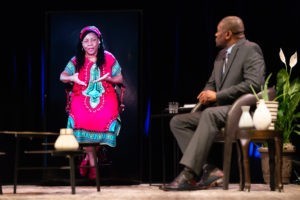
Wise Rowe
Wise Rowe explained that African Americans face trauma on multiple levels and its impact is cumulative. For example, when a Black person is pulled over by police, some just dismiss it as “no big deal,’ she said. However, many have “been pulled over not one, two or three, but hundreds of times.”
Such experiences diminish one’s ability to persevere, she declared. “When we experience a racial trauma, what happens is that our bodies are ready for fight or flight. We’re charged. Our hormones, our nervous system, body, everything is on high alert.”
If that stress is not addressed, Wise Rowe said, it continues to build as additional traumas are encountered. Racial trauma manifests itself in low self-esteem, anxiety, anger, irritability, hyper vigilance and depression, she said. “We start this preoccupation with anger and rage and also ambivalence and unresolved guilt.”
Time, she continued, does not heal all wounds inflicted by trauma. Instead, trauma is overcome by establishing safety, remembrance, mourning and reconnection with ordinary life.
Hill emphasized the need for African Americans to grasp a vision that things can be better. “I think it is important in this day and age that we find the space to dream and to find the courage to have a prophetic imagination to think beyond what is and to begin to imagine what can be.”
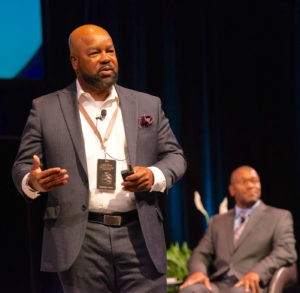
Hill
Having a dream changed his own life, Hill said. He grew up on the “edge of an old plantation in the belly of the South.” His father was a sanitation worker, and his mother was a nursing home caregiver. Hill said his life was shaped in his early years by the example of his parents, the nurture of his church, and an educational opportunity at Morehouse College that introduced him to the life and work of Martin Luther King Jr.
He eventually earned a doctorate in philosophical theology at Northwestern University and pursued a vocation as a scholar and a clergyman. His academic career has included service as dean of Shaw University’s divinity school.
Hill also spoke of a collective dream, a vision of a society grounded in human dignity and the sacredness of all lives. He has been encouraged by the Black Lives Matter movement, which he said has been supported by people of various faiths and races.
“I believe there is an awakening in our midst. The Black Lives Matter movement has shown there is a passion, there is a determination, there is a drive, there is a persistence that will not be deterred, and even though it may have appeared for just a moment, a glimpse, and then somehow settled down, the fact that we’ve seen it at work is a revelation of what’s possible.”
The Festival of Faiths is sponsored annually by the Center for Interfaith Relations in Louisville. At this year’s festival, area institutions of higher learning were invited to curate the conference’s sessions. Among those schools were two Baptist-related institutions, Simmons College of Kentucky and Baptist Seminary of Kentucky. Other participating institutions were Louisville Presbyterian Seminary, Spalding University and the University of Louisville.
Related articles:
Pastor and college president contends wealth gap fuels racial marginalization
Six ways white and multiethnic churches can heal the wounds of racial trauma | Opinion by Joel Bowman Sr.
Finding new life in the desert as a church becomes a place of healing for racial trauma | Opinion by Nataly Mora

